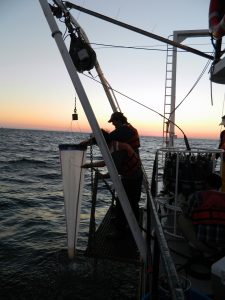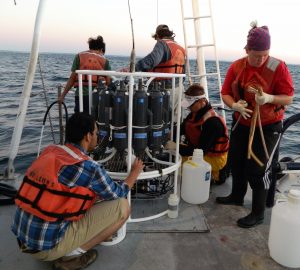Research at Sea – Tracking and Identifying Oil across the Florida Shelf
– May 1, 2012
March, 2012 — Dr. Ian MacDonald with Florida State University (FSU) and Dr. Richard Snyder with the University of West Florida (UWF) have been leading a research team to track and identify oil in sediment and water samples since January 2011. The Gulf of Mexico Research Initiative (GoMRI) supports this group’s work at sea as they contribute to understanding the effects of the Deepwater Horizon oil spill.
We are most concerned about the mixing of water masses from the deep Gulf with shelf and coastal waters and the biological reactions to the water mass mixing. With the potential for oil dispersed throughout the water column and on the surface coming onto the shelf from deepwater drilling activity, we realized that we knew very little about this area of the Gulf; its dynamics and biological reactions to changing environmental conditions. We will be sampling sediment and water across the shelf and the head of DeSoto Canyon to better understand the system and provide a benchmark from which to measure future stability or change — Dr. Richard Snyder, lead scientist.
Members of this research cruise team include Dr. Wade Jeffrey (UWF), Dr. Jim Nienow (Valdosta State), and Dr. Woody Wise (FSU). Graduate and undergraduate students are also on these cruises in support of the research and to obtain training in shipboard oceanography.
Their March 17-20 cruise out of Pensacola onboard the R/V Bellows continues their work on three transects covering the FL shelf south of Pensacola, Destin, and Panama City. Another cruise is scheduled in May. For more information about this project, visit the GoMRI FIO Projects (title: Coast Watch: Remote Sensing and Verification Sampling of Oil Spill Impact on Florida Coast).
Their sampling work will continue quarterly through 2013 as part of the GoMRI-funded DEEP-C research consortium where Dr. Ian MacDonald is the research cruise coordinator. Their first cruise is March 20-29 onboard the R/V Weatherbird II and will focus on the oceanographic dynamics associated with DeSoto Canyon and its connection with the deep Gulf and the Florida panhandle shelf. Their work will build upon previous sampling, collecting hydrographic, water chemistry, and biological data at all taxonomic levels.
This research was made possible by a grant from BP/The Gulf of Mexico Research Initiative. The GoMRI is a 10-year, $500 million independent research program established by an agreement between BP and the Gulf of Mexico Alliance to study the effects of the Deepwater Horizon incident and the potential associated impact of this and similar incidents on the environment and public health.
© Copyright 2010- 2017 Gulf of Mexico Research Initiative (GoMRI) – All Rights Reserved. Redistribution is encouraged with acknowledgement to the Gulf of Mexico Research Initiative (GoMRI). Please credit images and/or videos as done in each article. Questions? Contact web-content editor Nilde “Maggie” Dannreuther, Northern Gulf Institute, Mississippi State University (maggied@ngi.msstate.edu).







